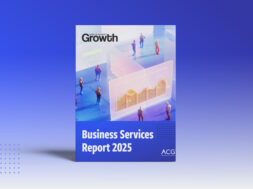Making Data Meaningful
BKD LLP may be nearly a century old but it’s on the cutting edge of technology. The firm has developed expertise in using data to enable its private equity clients to make better business decisions.

This content is sponsored by BKD LLP. It originally appeared in the May/June 2020 issue of Middle Market Growth. Read the full issue in the archive.
It’s a familiar refrain in business today: Data is a competitive weapon. That holds true not just for large corporations but also for midmarket businesses, if they have the right tools and expertise.
BKD LLP may be nearly a century old—it was founded in 1923—but it’s on the cutting edge of technology. Historically, the firm specialized in advising closely held companies, often family-owned. Today, with many of these companies being sold to private equity, the firm has developed expertise in using data to enable clients to make better business decisions.
“Through a combination of industry expertise and technology acumen, BKD offers our clients ways to find and leverage data to improve the operation of their companies and the performance of their investments,” says Christopher Dalton, partner and national practice leader of transaction services at BKD.
It does so primarily through a consulting service called BKD Optics and a technology solution called Financial Performance Insights.
Developing Data Expertise
BKD’s data expertise grew out of its transaction services team, which conducts buy- and sell-side due diligence for private equity firms and other corporate clients. Through that work, the team knew that small and medium-sized businesses often lack reporting on key metrics that private equity owners use to judge the sustainability of earnings and to identify opportunities for improvement.
“A lot of the information is there, it’s just not easy to access,” Dalton says. “The trick is to get the information out of the system, then aggregate it in a way that’s meaningful to private equity firms so they can make better investment decisions.”
Over several years, BKD’s transaction services team developed expertise in aggregating that information, eventually calling its consulting service BKD Optics. Meanwhile, the firm recognized new ways to leverage this valuable data beyond transactions.
“Our transaction services group would put together this fantastic data book that showed the value drivers of a company. But then after the deal, that information would get put aside because updating it was time-consuming and expensive,” says John Kmetz, national leader for BKD’s private equity practice. BKD wanted to use those insights to help private equity clients run companies over the complete life of their ownership. “After all, these same things will be what a new buyer focuses on in five years,” Kmetz adds.
New Ways to Use Data
To provide valuable insights for its private equity clients, BKD developed a solution called Financial Performance Insights, also known as FPI.

FPI extracts data from various disparate systems and aggregates it into one place in a common format (a data warehouse), enabling the user to slice and dice it in different ways. FPI is a combination of a licensed corporate performance management solution, a data warehouse, data visualization tools from Microsoft and BKD’s industry experience.
The tool creates several advantages for private equity, including streamlining and speeding up the onboarding process for tuck-in acquisitions. Deals happen fast, but acquisition targets often use different finance management systems. One company might use QuickBooks, for example, while another is on SAP. A lack of visibility and consistency of data across these businesses creates problems when trying to analyze synergies. But getting all the acquisitions in the portfolio company onto a single system can be expensive and time-consuming.
“Today, the private equity firm may have an analyst grinding away with spreadsheets. It’s very manual and inefficient, and it doesn’t leverage the power of cloud computing and the data analytics tools that are available,” Kmetz says.
FPI also enables a firm to find and compare very granular data. The tool includes templates— developed through BKD’s expertise—for reporting on very specific types of businesses. It goes beyond categories like “manufacturing” or “technology” and allows clients to dig deep into their niche drivers. It saves clients time and money because they don’t have to build their own unique dashboards and reports.
For instance, a specialty chemical manufacturer and a recreational vehicle manufacturer would use different metrics to track production and inventory turns. The chemical-maker keeps tabs on batches, formulas and process time, whereas the RV company tracks activity along an assembly line.

“Both are concerned with inventory turns and with cash flow, but with FPI, you can drill down to the micro level in your vertical,” Kmetz says
Another example where FPI’s templates prove valuable is in the software industry, where there can be major differences in revenue streams. Traditional software vendors make money from clients that purchase long-term licenses, whereas clients of software-as-a-service companies usually pay on a month-to-month basis. The metrics that drive these two flavors of software companies are so different that a solution for general software companies wouldn’t be very useful.
PUTTING BKD EXPERTISE INTO PLAY
BKD clients use FPI in a variety of ways. Some PE clients buy one FPI license to manage their groups of companies. It’s less expensive to use FPI to roll up all the financials into one reporting package than to replace all the legacy systems with an enterprise-level solution.
“PE groups don’t necessarily have to implement planned integration immediately in order to be able to digest the business right away,” says Anthony M. Giordano, president of BKD Capital Advisors. “The FPI dashboard enables them to look at the data from every angle. They can really get behind the numbers.”
“The trick is to get the information out of the system, then aggregate it in a way that’s meaningful to private equity firms so they can make better investment decisions.”
Christopher Dalton
Partner, BKD LLP
But if a private equity group plans to sell some of the companies quickly, buying individual FPI licenses for each portfolio company is a way to maintain separate, standardized, high-quality financial reporting until the sale. They could even include the FPI subscription in the deal so the new owners start with the same quality of data. In that way, FPI removes a common roadblock to quick integration—it makes data available and consistent.
FPI can also accelerate transactions and helps the parties avoid “deal fatigue” from all the back and forth that happens when a buyer requests particular information in specific ways, says Giordano. The seller gets frustrated and the buyer grows impatient, resulting in the deal losing momentum and potentially falling apart.
“In this business, time can kill transactions,” Giordano warns. FPI helps answer these questions quickly with standard tool sets. “Managing an efficient and timely diligence process is very valuable from the investment banking perspective,” he adds.
Good Date is Good for All
Private equity firms, portfolio companies and privately held companies can all benefit from BKD Optics and FPI. Optics helps a company see a snapshot at a specific point in time, enabling it to analyze historical data in ways it may not have considered. Either as an extension of Optics or alone, FPI is a real-time tool that continually takes in and analyzes new data with reporting tools, helping a company see how it’s doing and stay on track to meet goals.
Whether a private equity firm, a portfolio company or a privately held business, BKD offers expert advice and tools that enable organizations to find and take advantage of valuable data in ways that further their business interests.
Financial Performance Insights and Covid-19
The COVID-19 pandemic has disrupted many lives and businesses, and it has highlighted more than ever the need for real-time data analysis on a mobile viewing platform.
Financial Performance Insights is a subscription service that combines BKD’s deep industry expertise with market-leading corporate performance management, data warehousing and data visualization technology to provide a turnkey dashboard and reporting solution to midmarket businesses. FPI enables firms to:
- Rapidly consolidate reporting from disparate sources and financial systems
- Visualize value drivers, including key financial and operational data, in real time
- View dashboards through a personalized web portal, including via mobile devices
- Present pro forma results for add-ons—as if the transactions occurred prior to the closing date
- Present normalized “adjusted” operating results by applying EBITDA adjustments to reported balances, removing the noise from the numbers


